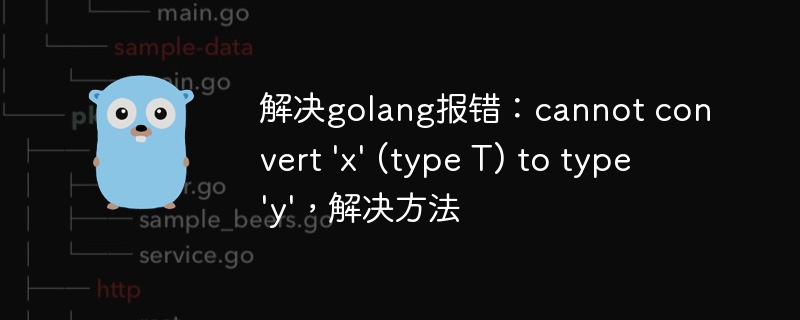Home >Backend Development >Golang >Solve golang error: cannot convert 'x' (type T) to type 'y', solution
Solve golang error: cannot convert 'x' (type T) to type 'y', solution
- 王林Original
- 2023-08-19 22:19:081171browse

Solution to golang error: cannot convert 'x' (type T) to type 'y', solution
In the process of using Golang programming, we often encounter to type conversion issues. Sometimes, we need to convert one type to another type in the code, but we receive an error message similar to "cannot convert 'x' (type T) to type 'y'". This error is very common, but it is somewhat troubling. In this article, we'll take a closer look at this issue and provide a workaround and code examples.
First of all, let’s understand the meaning of this error message. This error tells us that we cannot convert a variable x of type T to type y. Golang is very strict in the type conversion process. Type conversion can only be performed when the two types are compatible and meet specific conversion rules. If the types are incompatible, this error will appear.
Next, let’s look at some ways to solve this problem. According to specific scenarios and needs, we can use the following methods to perform type conversion.
- Use type assertions: If we need to convert a variable of an interface type into a specific type, we can use type assertions to achieve this. The syntax of type assertion is: value, ok := expression.(T). Among them, expression is the expression we want to perform type conversion, and T is the type we want to convert to. When using type assertions, we need to check the value of ok to determine whether the conversion was successful.
package main
import "fmt"
func main() {
var i interface{} = 10
// 将接口类型转换成整型
if v, ok := i.(int); ok {
fmt.Println(v)
} else {
fmt.Println("类型转换失败")
}
}- Use the strconv package: If we need to convert the string type into other types, we can use the functions provided by the strconv package. The strconv package provides functions for converting strings into integers, floating point, Boolean, etc.
package main
import (
"fmt"
"strconv"
)
func main() {
str := "10"
// 将字符串转换成整型
if i, err := strconv.Atoi(str); err == nil {
fmt.Println(i)
} else {
fmt.Println("类型转换失败")
}
}- Use cast: If we need to convert two custom types with the same base type, we can use cast. The syntax for cast is: type(yourType)(expression). When performing type conversion, you need to ensure that the two types are compatible, otherwise potential errors will occur.
package main
import "fmt"
type T int
func main() {
var x T = 10
// 将自定义类型T转换成整型
y := int(x)
fmt.Println(y)
}Through the above solutions and code examples, we can solve the problem of "cannot convert 'x' (type T) to type 'y'" error. When encountering this error, we can choose the appropriate method to perform type conversion according to the specific situation. At the same time, when performing type conversion, you also need to pay attention to the compatibility between types to avoid other type conversion errors.
To summarize, type conversion is a problem often encountered in Golang programming. When the error "cannot convert 'x' (type T) to type 'y'" occurs, we can use type assertions, strconv package or forced type conversion to solve it. You need to pay attention to compatibility when performing type conversion to avoid errors in other type conversions. I hope the content of this article can help everyone solve this problem.
The above is the detailed content of Solve golang error: cannot convert 'x' (type T) to type 'y', solution. For more information, please follow other related articles on the PHP Chinese website!

